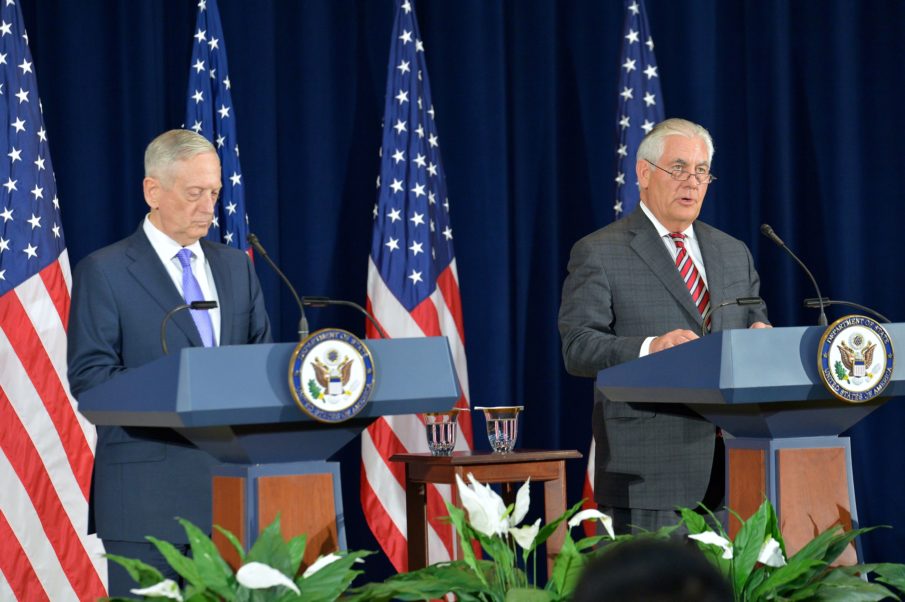America’s top diplomat and the leader of its military penned a joint Op-Ed for the Wall Street Journal last week, titled “We’re Holding Pyongyang to Account,” in which they laid the groundwork for America’s new strategy regarding North Korea under President Trump’s administration.
Secretary of State Rex Tillerson and Secretary of Defense James Mattis joined forces last week to explain the U.S.’s stance on Kim Jong-un’s North Korean regime, assuaging some concerns about the potential for war with North Korea, while still emphasizing a new, more assertive stance toward the reclusive state.
Although tensions have been increasing between the U.S. and North Korea for months, the combination of new long-range missile tests and U.S. intelligence confirming Kim does indeed have the technological capability to create small enough nuclear warheads to mount on said missiles, saw a dramatic shift in U.S. rhetoric toward Kim’s regime. President Trump took to the media, and to Twitter, to threaten Kim with “fire and fury,” if he were to initiate war with the United States, and in interviews conducted at the Pentagon, Secretary Mattis doubled down on the president’s threat, saying a missile strike on Guam would bring about war.
In the piece, Mattis and Tillerson lay out the clear criteria for victory in their diplomatic efforts:
The Trump administration, with the support of the international community, is applying diplomatic and economic pressure on North Korea to achieve the complete, verifiable and irreversible denuclearization of the Korean Peninsula and a dismantling of the regime’s ballistic-missile programs.”
The piece goes on to explain that the previous strategy of “strategic patience” now has a formally titled replacement; “We are replacing the failed policy of “strategic patience,” which expedited the North Korean threat, with a new policy of strategic accountability.”
North Korea has made it clear that any attempt at removing the North Korean Kim dynasty from power would immediately result in retaliatory nuclear strikes, though defense officials have long attested that the United States is seeking a denuclearized North Korea, not a Kim-less one. In their piece, Tillerson and Mattis again emphasized this point, while delineating the North Korean populous from their aggressive government.
The object of our peaceful pressure campaign is the denuclearization of the Korean Peninsula. The U.S. has no interest in regime change or accelerated reunification of Korea. We do not seek an excuse to garrison U.S. troops north of the Demilitarized Zone. We have no desire to inflict harm on the long-suffering North Korean people, who are distinct from the hostile regime in Pyongyang.”
Despite making it clear throughout the piece that Mattis, Tillerson, and President Trump all prefer a diplomatic resolution to the rising tensions on the Korean peninsula, they also made sure to temper their somewhat peaceful statements with a reminder that the U.S. is prepared, if necessary, to use kinetic options to achieve their goals.
While diplomacy is our preferred means of changing North Korea’s course of action, it is backed by military options. The U.S. alliances with South Korea and Japan are strong. But Pyongyang has persistently rebuffed Seoul’s attempts to create conditions whereby peaceful dialogue can occur, and has instead proceeded on its reckless course of threats and provocation.”
Later in the article, they again emphasize that the U.S. will retaliate to any North Korean attack.
Already have an account? Sign In
Two ways to continue to read this article.
Subscribe
$1.99
every 4 weeks
- Unlimited access to all articles
- Support independent journalism
- Ad-free reading experience
Subscribe Now
Recurring Monthly. Cancel Anytime.
“Any attack will be defeated, and any use of nuclear weapons will be met with an effective and overwhelming response.”
The two men use those provocations as an explanation for the further deployment of additional THAAD missile defense systems to be deployed in South Korea in order to bolster the allied ability to shoot down any ballistic missile launched toward American or allied targets, as well as scheduled U.S./South Korean military exercises scheduled to begin later this month. Although China has claimed both of these moves will only escalate tensions, Tillerson and Mattis point out that both of the moves are strictly defensive in nature. They even go so far as to suggest that Chinese politicians decrying the THAAD system may not actually understand the technology they’re opposing.
“China’s demand for the U.S. and South Korea not to deploy Thaad is unrealistic. Technically astute Chinese military officers understand the system poses no danger to their homeland.” They said.
The piece also asks that China and Russia commit to not providing an economic lifeline to North Korea as the United States continues to use economic sanctions to isolate the regime and force it to surrender its nuclear arsenal – something both nations have repeatedly been accused of doing. China and Russia have indeed increased economic ties with North Korea in recent months, but both nations claim those ventures fell outside of the restrictions levied by the United Nations.
North Korea now faces a choice. Take a new path toward peace, prosperity and international acceptance, or continue further down the dead alley of belligerence, poverty and isolation. The U.S. will aspire and work for the former, and will remain vigilant against the latter.”
Image courtesy of the U.S. State Dept.










COMMENTS